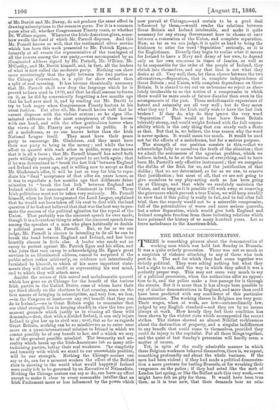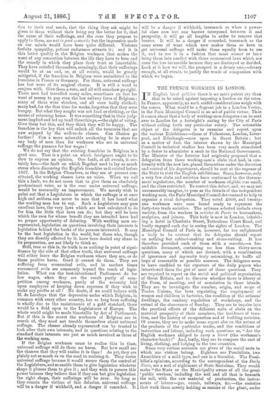THE BELGIAN DEMONSTRATION.
THERE is something piteous about the demonstration of working men which was held last Sunday in Brussels. It was a quite orderly procession. There was not so much as a suspicion of violence attaching to any of those who took part in it. The end for which they had come together was strictly political. They were asking nothing but what they had a right to ask, and the way in which they asked it was a perfectly proper way. This may not seem very much to say of a political procession, when the authorities offer no opposi- tion to it, and the police make a free passage for it through the streets. But it is more than it has always been possible to say of similar demonstrations in England, and more than could have been predicted with any confidence of this particular demonstration. The working classes in Belgium are very poor. Their wages, when at work, are low—extraordinarily low, judged by any English standard—and they are by no means always at work. How keenly they feel their condition has been shown by the violent riots which accompanied the recent strikes. The rioters showed an almost Nihilist recklessness about the destruction of property, and a singular indifference to any benefit that could come to themselves, provided they could do injury to the capitalist. Put all these thing's together, and the quiet of last Sunday's procession will hardly seem a matter of course.
Yet, in spite of the really admirable manner in which these Belgium workmen behaved themselves, there is, we repeat, something profoundly sad about the whole business. If the men had been violent ; if they had made a political demonstra- tion a mere pretence for looting Brussels, or for wreaking their vengeance on the police ; if they had acted like the mob of London last spring, or like the Belfast mob this very week,—we might have felt no pity for them. It would have been true then, as it is true now, that their demands bear no rela-
tion to their real needs, that the thing they ask might be given to them without their being any the better for it, that the cause of their sufferings, and the cure they propose to apply to them, are not in pari materiel; but the impression made on our minds would have been quite different. Violence forfeits sympathy, patient endurance attracts it ; and it is this latter quality in the Belgian workmen that makes the want of any connection between the ills they have to bear and the remedy in which they place their trust so lamentable. They have satisfied themselves, seemingly, that their sufferings would be at an end, or, at all events, would be greatly mitigated, if the franchise in Belgium were assimilated to the franchise in France or Germany. For them, universal suffrage has lost none of its magical charm. It is still a word to conjure with. Give them a vote, and all will somehow go right. These men had travelled many miles, sometimes on foot for want of money to pay even the low railway fares of Belgium ; many of them were shoeless, and all were badly clothed; many had, for the first time for weeks, forgotten that they were hungry. But what they sought was not food or clothing, or the means of returning home. It was something that in their judg- ment implied and led up to all these things,—the right of voting. Give them but this, and they think they will be happy. The franchise is the key that will unlock all the treasures that are now enjoyed by the well-to-do classes. Can illusion go further? Can a more miserable awakening be in store for any body of men than for workmen who see in universal suffrage the panacea for low wages ?
We do not say that the existing franchise in Belgium is a good one. That is a point on which foreigners ought to be slow to express an opinion. One fault, at all events, it cer- tainly has,—the fault on which Bagehot used to lay so much stress when discussing the English franchise as it existed before 1867. In the Belgian Chambers, as they are at present con- stituted, the working classes have no voice. When we call this a fault, we do not mean that to give them an absolutely predominant voice, as is the ease under universal suffrage, would be necessarily an improvement. We merely wish to point out that a Legislature in which the suffrage is at once high and uniform can never be sure that it has heard what the working man has to say. Such a Legislature may pass excellent laws, the very laws which are best calculated to do for him the little that laws can do ; but they will be laws which the men for whose benefit they are intended have had no proper opportunity of debating. With working men un- represented, legislation on questions involving their interests is legislation behind the backs of the persons interested. It may be the best legislation in the world, but those who, though they are directly affected by it, have been denied any share in its preparation, are not likely to think so.
Still, true as this is, its truth is as nothing in point of signi- ficance by the aide of that other truth, that universal suffrage will either leave the Belgian workmen where they are, or do them positive harm. Good it cannot do them. They are suffering from economical evils, and in modern times economical evils are commonly beyond the reach of legis- lation. What can the best-intentioned Parliament do for low wages, when they are the result partly of com- petition among workmen, partly of the necessity laid upon employers of keeping down expenses if they wish to make any profits at all ? No doubt, if we could believe with M. de Laveleye that the depression under which Belgium, in common with every other country, has so long been suffering is wholly due to the maintenance of a gold standard, there would be a field open to the Legislatures of Europe. The whole world might be made bimetallic by Act of Parliament. But if this is the secret the workmen of Belgium are in search of, they need not trouble themselves about universal suffrage. The classes already represented can be trusted to look after their own interests, and in questions relating to the standard their interests are just as much involved as those of the working men.
If the Belgian workmen come to realise this in time, universal suffrage will do them no harm. But how small are the chances that they will realise it in time ! As yet, they are plainly not so much as on the road to realising it. They desire universal suffrage because it would secure them the control of the Legislature, and so enable them to give legislation whatever shape it pleases them to give it ; and they wish to possess this power because they believe that if they can but give legislation the right shape, their sufferings will be over. So long as they remain the victims of this delusion, universal suffrage will be a danger if withheld, and a danger if conceded. It will be a danger if withheld, inasmuch as when a power- ful class sees but one barrier interposed between it and prosperity, it will go all lengths in order to remove that barrier. It will be a danger if conceded, inasmuch as the same sense of want which now makes them so keen to get universal suffrage will make them equally keen to use it, and to use it in a fashion that must sooner or later bring them into conflict with those economical laws which are none the less inexorable because they are disobeyed or derided. Look at it how we will, the prospect is a dreary one,—dreary enough, at all events, to justify the words of compassion with which we began.



































 Previous page
Previous page